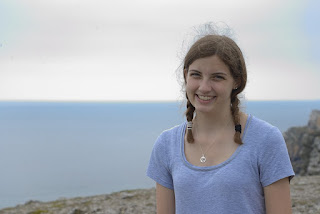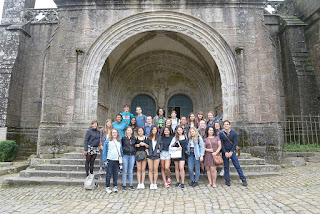Loïc is just the best!
Friday was
our final excursion in Brittany (Bretagne). We decided to keep things close, so
there would be less drive time and more to see.
We began in
Locronan. This is a village that literally dates from Roman times. There was an
intense rope-making and sail-making industry there as early as the 1500s. It’s
close to the sea, so that makes sense. However, the Industrial Revolution took
root farther east and north. Rope and sail making became mechanized in Lille
and Calais, leaving Locronan with its old buildings and no industry.
So, they
kept all the old buildings over the centuries. It was the first village
designated as an historic site in France in 1833, under the reign of
Louis-Phillippe. Locronan has received the designation “Un de plus beaux
villages de France” twice (One of the most beautiful villages in France).
We visited
the church of Saint Ronan. Who couldn’t like a saint who brings a sheep back to
life and gets even with someone even after his death? Ronan is buried in the
church. Actually, he is in a stone rendering of his body. I have pictures.
There we
were treated to a display of the creation of the unique Breton pastry, the
Kouign Aman. The looks on the faces of the students tell the story. It starts
with 500 grams (about a pound) of the same dough that makes croissants. That is
pounded into a circle. Then 500 grams of butter is pounded into a pancake
placed on top of the dough. Then 250 grams (a half pound) of sugar is spread
over the top.
It is all
folded together so none of the yummy goodness can escape. It is then flattened
and folded and flattened and folded several times in a rolling machine. The
final dough is divided into four parts and placed in pans. The Kouign Aman is
then slowly baked over a period of two hours until the most amazing pastry
emerges.
Ask your
kids when they get home. Their eyes will roll back in their heads at the
memory.
After, we
passed by the Pointe des Espagnols. This is a high point on the opposite side
of the immense harbor of Brest from the city. Here, Louis XIV in the 1600s
established a fort. The Spanish wanted to attack Louis, and the Rade de Brest
was an obvious point of entry, thus the fort. There’s not much left of the
fort, but the views are awesome.
From there,
it was on to Camaret sur Mer, a small port city, where we had our lunch on the
beach.
It just so
happened that that was the embarkation point for the 7.1 kilometer hike to
Pointe de Pen Hir, the amazing rock formation/cliff that defines that part of
Bretagne.
For me, a
7.1 kilometer hike, 4.4 miles, is a big deal. Not for these kids. They just
forged ahead. I broke into a sweat in the first kilometer. Not the kids. The
biggest problem was all the breaks they wanted to take to get photos.
We were on
a bit of a schedule, as a few families had plans. We needed to get back home by
5:30pm. But the kids were so into it, we were 45 minutes behind by lunch. It’s
cool. You just work with it.
The
students had an incredible hike. The got to see old German gun emplacements from
Hitler’s “Atlantic Wall” from World War II. They got to see some of the most
amazing geological formations in all of Europe, as well as some of the most
beautiful beaches.
We ended
the day with a quick visit to an arrangement of huge stones, in the vein of Stonehenge
that have been there since the dawn of time. No one knows why they are there.
But they seem to line up with the constellation Pléiades.
All in all,
it was a good day. And we got the students where they needed to be when they
needed to be.
| 






































It looks like they’re having a wonderful time! Thank you for sharing!
ReplyDeleteThanks for sharing, very happy to see the kids having an good time and experience that they can treasure for a life time!
ReplyDeleteThank you for all the recent updates!!
ReplyDelete👍🏼💕
ReplyDelete